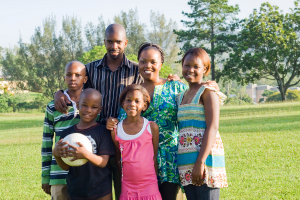Taking stock of the progress made by the SRHR Initiative in the African Region during the year 2020
WHO in the African Region has been implementing a four-year initiative, launched in January 2019, to enhance existing efforts for reducing preventable maternal morbidity and mortality. It emphasizes on eliminating maternal deaths due to unsafe abortion, as an important contributor to the reduction of maternal mortality in the African Region. The Initiative focuses on the provision of Sexual and Reproductive Health and Rights (SRHR) services within the Universal Health Coverage (UHC) framework. It focuses on the most vulnerable populations, including those living in humanitarian settings, using a health system strengthening approach.
"The health system strengthening approach of this Initiative is key to address the challenges in the Region. We believe this method can provide lasting benefits, achieving resilient systems of health, contribute towards UHC, and meet the needs of the vulnerable and marginalized groups" Dr. Geoffrey Bisoborwa, Universal Health Coverage/Life Course Cluster Acting Director.
This is the second year of implementation of the Initiative. It was therefore imperative to take stock of progress made since 2019 and plan for 2021 – hence AFRO organized a virtual review and planning meeting with all the implementing countries on the 3rd December 2020.
"It is important to take stock of the progress made, discuss the challenges to be overcome and identify practical solutions to strengthen the implementation of the initiative to accelerate the achievement of Sustainable Development goals, in particular for the reduction of maternal mortality (SDG 3.1), universal access to sexual and reproductive health services (SDG 3.7) and sexual and reproductive health and reproductive rights (SDG 5.6)." Dr. Geoffrey Bisoborwa.
The four countries selected for initial inclusion in 2019 were Benin, Burkina Faso, Rwanda, and South Africa. In mid-2020, Sierra Leone was brought on board as a new focus country for the Initiative. The focus countries of the Initiative are those with a high burden of unintended pregnancy and unsafe abortions and who have expressed the need and willingness to expand access to safe abortion, including post-abortion care and post-abortion contraception.
"We are together to stop the deaths of women and children on our beloved continent, Africa." Dr. Triphonie Nkurunziza, Team Lead for Reproductive and Maternal Health WHO Regional Office for Africa.
Outstanding achievements presented by the four countries include:
- In Benin, 283 pharmacists and people responsible for epidemiological surveillance have been trained in the recording and evaluation of adverse drug reactions resulting from the use of drugs including those for abortion-related services (pharmacovigilance)
- MoH Burkina Faso was supported in the development of national guidelines for caesarean section practice and monitoring tools with the use of the Robson index. Also, the joint country assessment of continuity of sexual and reproductive health services during the COVID-19 period in the five regions affected by the humanitarian and the public health crises permitted to mobilize funding in a short period for the installation of solar panels for a center to house the blood bank in Dori, the purchase of a generator, and the construction/rehabilitation of 11 advanced health posts in the Sahel region – all these will contribute to improving the provision of reproductive and maternal health services in these difficult-to-reach parts of the country
- In Rwanda, Post Abortion Care training manual was updated and disseminated to 299 clinicians
- In South Africa, the national consolidated Sexual and Reproductive Health Policy was developed and disseminated at national level. Also, the Termination of Pregnancy (ToP) Act Clinical Implementation Guideline has been finalized and disseminated. Finally, WHO is supporting the continuity of essential SRHR services in the context of COVID-19 through routine data analysis of SRHR services for advocacy.
Despite the uncertainties associated with the current COVID-19 pandemic, SRHR teams remained active to improve sexual and reproductive health and rights in the WHO African Region by emphasizing on technical support, policy dialogue and advocacy. The active engagement of the SRHR teams in the COVID-19 response permitted integration of SRHR services into this response.
Medical Officer
Sexual and Reproductive Health
Email: ouedraogol [at] who.int
Tel: +242 06 671 28 28
Technical Officer,
Sexual and Reproductive Health and Rights
WHO Regional Office for Africa, IST for West and Central Africa
Email : asmanic [at] who.int
Technical Officer,
Sexual and Reproductive Health and Rights
WHO Regional Office for Africa, IST for East and Southern Africa
Tel. +47 241 38407
Email: elaminha [at] who.int
Technical Officer - Communication
Sexual and Reproductive Health and Rights
Tel: +(47 241) 39571/+242 05 771 4301
Email: asekpon [at] who.int



